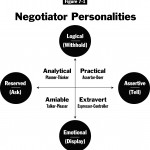Golden Rule of Negotiation, Part II
Editor’s note: this is Part II of a two part series. Part I identifies the Golden Rule of Negotiation and Part II explains how to apply it.
Fortunately, we do not need to be social science experts to be effective in our negotiations in the same way that one need not be a nutritionist to know how to eat healthy. Our communication skills matter far more than do our ability to identify and manage personalities. Expressed in relative terms, communication skills are more useful than personality skills in negotiation. Nevertheless, personalities are important to the extent that they dictate how people communicate so we need to know more about the subject.
Interpersonal skills matter because they identify a negotiator’s signature communication style. Negotiation is a stressful event. Under stress, we resort to our strongest behavior type or dominant personality.
A personality is a composite of multiple styles. The style in force depends upon the stimuli of the situation. For instance, aggression surfaces naturally when we play competitive contact sports, but not when we watch the graduation ceremony at the day care center. The personality of the CEO is probably much different than the research engineer. So too will be their communication styles. The Golden Rule of Negotiation tells us that we need to approach them, sell to them and buy from them in the manner that they, not we, find appropriate. Resort to a graphic is helpful.
The chart below is an iteration of thousands of similar graphics you have probably seen. It shows four basic personality types defined by the extremes at each end of the axes.
This adaptation of personality studies applies to negotiation for a specific reason. We know that a personality is a complex composite of multiple types. Negotiation requires and resolves conflict and conflict involves stress. Stress invokes the fight or flight response. Greatly simplified, we resort to our strength when facing stress. Our dominant personality type tends to be the major force we summon to confront important challenges. Therefore, if we can identify the dominant personality type of our negotiation counterpart, we are able to estimate how best to communicate with them.
Refer to the chart. The personality types are organized along the horizontal and vertical axes. Call the vertical axis the Reason/Emotion line. It is the rough equivalent of left brain at the top, and right brain at the bottom. Logicals have strong scientific traits, favoring thoughts over feelings. They withhold feelings. Emotionals have strong humanistic traits and favor feelings over thought. They display emotions.
Call the horizontal axis the Assertiveness line. The Reserved folk prefer asking, even when making demands, while the Assertive ones prefer to tell, even when asking. The axes intersect to create four personality zones. These zones provided ample clues to their communication preferences.
In the upper left live the Analytics. This zone’s markings are high reason and low assertiveness. They think carefully and methodically and favor charts, graphs, and reams of supporting documentation. They prefer to read and study in advance rather than to hear the information on the spot. They do not get very excited, are cautious about their vulnerability, act consistently, and generally hold their cards close to the vest. Plenty of engineers, accountants and other process oriented personnel fall into this zone.
In the upper right dwell the Practical who are high on reason and assertiveness. These are the fellows who are prone to snap decisions. Typically, they are in a hurry, even while relaxing. This commander does not let facts stand in the way of a decision because instinct is a good substitute. Their driving personalities dispose them toward goals and competition; they welcome challenges, take control, question authority and want immediate results. Bosses, leaders, and high level managers in positions of responsibility populate this zone.
In the lower right reside the Extraverts reside. This zone has both high emotionalism and high assertiveness. The Expresser types share some traits with the Practicals in that they too are impulsive, and competitive. They however enjoy limelight and excitement more than results and prefer creativity over reality in problem solving. They value feelings and relationships. HR, customer service, and sales professions are comfortable in this zone.
In the lower left, the Amiables thrive on high emotionalism and low assertiveness. They like conformity to the groups and they follow rules readily, do not follow through and need reassurance. They ask many questions, including personal ones, in order to avoid hurting anyone’s feelings. Agreeable, supportive and polite, they have difficulty making decisions because they want to please people. They often change their conclusion because the last viewpoint was the most influential. Negotiation is not high on the list for folks in this zone to pursue.
I offer am empiric observation about personality types. The plurality of purchasing and sales pro personalities is in the Analytical, Practical and Extravert zones. Further, more purchasing types trend toward the two logical zones (Analytical and Practical) and more sales types trend toward the two assertive zones (Practical and Extravert). It makes eminent sense in the traditional roles that buyers would be the engineers, accountants, bosses and high level managers who favor processes while sales pros are assertive, people oriented relationship types.


